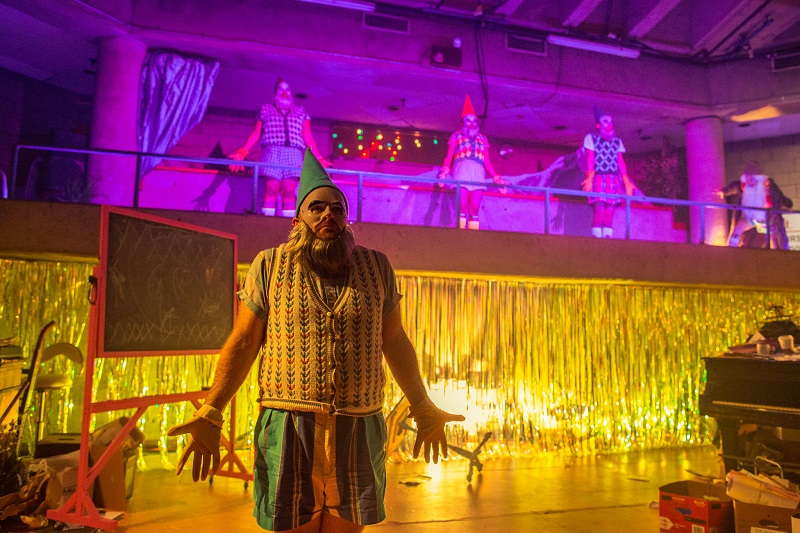
NOW IS THE TIME. NOW IS THE BEST TIME. NOW IS THE BEST TIME OF YOUR LIFE., the world premiere play by Brooklyn's Little Lord theater company, takes its extensive title from "The Best Time of Your Life," written in 1974 as a new theme song for Walt Disney's Carousel of Progress attraction. The Disney portion of this allusion is, on the whole, less important to Now is the Time, which boasts a running time of 300 years, than is the contradiction inherent in the image of a historical progress that is also a circle, endlessly accumulating and endlessly vanishing. The accumulation is made concrete by the set, presided over at the beginning by soda jerks with pickles and slaw, the surfaces and cubbyholes of which are stuffed and stacked with papers, boxes, and other rubbish. Rubbish is history, and history is, or becomes, rubbish.
The particular history at issue here is that of New York City, a great city that has risen and will fall, as other great cities have risen and fallen; and our primary window onto that history is Diedrich Knickerbocker (Michael Levinton). Knickerbocker was a pen name of Washington Irving's, and Little Lord's Knickerbocker is often accompanied onstage by Rip Van Winkle (Lisa Rafaela Clair), a creation of Knickerbocker's. The play reimagines Irving/Knickerbocker's work on his satirical book A History of New York from the Beginning of the World to the End of the Dutch Dynasty (1809) as a kind of Tristram Shandy-esque attempt to produce an exhaustively comprehensive historiography of New York stretching until, as Knickerbocker puts it, "the ULTIMATE DISSOLUTION OF THE KNOWN UNIVERSE!" (The actual book had its own history, growing more serious over a series of revised editions issued during the 39 years after its publication.) This Sisyphean task reflects the belief, which retained its currency through the 18th century, that one man could catalog the entirety of something (see: Samuel Johnson's A Dictionary of the English Language), but Little Lord's Knickerbocker also is possessed of the modern awareness that what we call knowing history is, of necessity, really a process of forgetting and simplifying. Indeed, his wife, Dame Derailment (Morgan Lindsey Tachco), acting as an insult-flinging borscht belt comedian when she's not a (literal) harpy, periodically informs Knickerbocker that he is nothing, and he and his work will both amount to nothing. Rather than attempt to bring the Promethean fire of historiography to mankind, she suggests, he could have been a dentist.
Along with this vaudevillian heritage, there is also some Beckettian DNA in NOW IS THE TIME's lineage, the sense that Knickerbocker is being directed by some buzzer-wielding offstage presence, for example, calling to mind the existentialist meta-theater of plays like What Where. Here, anxieties about history and its carousel are also about performance: "What did I miss?" is one of Knickerbocker's multivalent refrains. Another: "Didn't we talk about this already?" A chorus of garden gnomes (Kaaron Briscoe, Avi Glickstein, Fernando Gonzalez, Sauda A. Jackson, and Ry Szelong) embodies some of this anxiety as well, in part through snippets of culture gone by, which includes a legitimately creepy performance of a folk round. Of course, this occurs in a play that also features one of the more unique takes on "New York State of Mind" that you are likely to hear. By the time that Knickerbocker is published and commodified, the gnomes have shifted into a new form (or been replaced), and our author is left to exclaim to them, in the words of J. Alfred Prufrock, denizen of another storied city. "THAT IS NOT WHAT I MEANT AT ALL; / THAT IS NOT IT, AT ALL."
That is also not nearly it, at all, when it comes to NOW IS THE TIME. There are many further layers to this production, as it deftly uses the frame of NYC history to open onto interweaving personal, urban, and cosmic histories; to touch on fragmentations and metamorphoses of the self; and to interrogate self, city, and art, even making such questions literal in one section and directed, seemingly, at the audience. The excellent, immersive use of lighting and sound, especially of quiet, silence, and whispers, complements admirable work by the cast, especially Michael Levinton and Lisa Rafaela Clair, who give fantastic performances, imbued with nuance that is almost surprising in such as absurdist piece.
With NOW IS THE TIME, Little Lord has created an anarchic pastiche of voices, atmospheres, songs, and other cultural flotsam that is by turns, funny, unsettling, and strangely affecting, but always mesmerizing. Before it becomes another part of the sedimentary layers of this city's history, make it part of your own history, too. Where do you see the past when you look at current things? Rip Van Winkle wants to know. - Leah Richards & John Ziegler
